According to media reports, an unofficial meeting among representatives of North and South Korea, and the US took place Monday in the Finnish capital Helsinki. The gathering discussed the nuclear crisis on the Korean Peninsula in the run-up to the planned summit between US President Donald Trump and North Korean leader Kim Jong-un.
A diplomatic window is opening for peaceful settlement of the nuclear issue. But analysts believe Pyongyang would not easily relinquish its nuclear weapons in which it invested so much money even though it is willing to negotiate.
The aim of North Korea's weapons program is to build nuclear bombs small enough to fit on missiles' warheads, develop missiles capable of hitting US soil and then use this as a bargaining card with Washington. Pyongyang's sixth nuclear test and the launch of an intercontinental ballistic missile, Hwasong-15, in 2017 showed that the nation's primary strategic goal has been reached. Now North Korea is confident to talk with the US.
Undoubtedly, Pyongyang will put forward preconditions for denuclearization. It wants a peace agreement with the US and diplomatic ties with Washington so that its security can be guaranteed. Moreover, it wants international assistance for its economy. Will Washington make compromises over these issues? We need to wait and see. That being said, resolving the North Korean nuclear issue will not be easy.
Against the backdrop, China should play a role to ensure that the US considers solving Pyongyang's security concerns while preventing North Korea from leaving the negotiation table. The most crucial step for now is to maintain sanctions against North Korea under the framework of the UN Security Council.
The essence of the nuclear crisis is the antagonism between Pyongyang and Washington. For the moment, the differences have not been settled and the two sides have only reached a consensus over resuming negotiations. What we are seeing now is just the two countries beginning to take the road to a peaceful solution. Summits between Pyongyang and Seoul, and Pyongyang and Washington will likely take place. But a few interactions among heads of states won't solve the nuclear issue. It requires a package plan within a multilateral framework, in which China's role will become more and more prominent.
Issues such as establishing a peace mechanism on the peninsula, providing economic assistance to North Korea and resolving the disputes over US deployment of Terminal High Altitude Area Defense anti-missile system in South Korea cannot be settled without China.
In a phone call with Chinese President Xi Jinping on March 9, Trump said Xi was right to insist on a dialogue between the US and North Korea. One day later, Trump tweeted: "The deal with North Korea is very much in the making and will be, if completed, a very good one for the World," adding that "China continues to be helpful!" Trump's statements were not only an affirmation of China's role in resolving the nuclear issue, but also a repudiation of comments such as "China was left behind" and "China was marginalized" in foreign media.
South Korea's Olympic diplomacy benefited from China's strong support. When South Korean President Moon Jae-in visited China and met Xi in December last year, he stressed the significance of Beijing-Seoul cooperation. The two sides reached consensus over peacefully resolving the North Korea issue through negotiations.
In addition, the two Koreas have accepted China's proposal over "dual suspension" and "dual track approach," seeking to advance denuclearization and establish a peace mechanism in parallel.
Moon suggested that US-South Korean military drills be postponed till after the Winter Olympic Games, urged formation of a joint Korean hockey team and invited North Korea's delegation to the Games. These moves created goodwill with Pyongyang and received positive response from North Korea. During the Games, Pyongyang did not conduct any nuclear or missile test.
The 2018 Winter Olympics in Pyeongchang was a test of China's "dual suspension" proposal.
China will keep its role of mediator in inter-Korean ties as well as interactions between the US and North Korea. Be it Pyongyang-Seoul summit in Panmunjom in April or a possible Trump-Kim meeting in May, Beijing welcomes them all and looks forward to long-term peace and stability on the Korean Peninsula.
The author is a professor on international politics at the College of Public Administration, Jilin University and a research fellow at the Co-Innovation Center for Korean Peninsula Studies.









